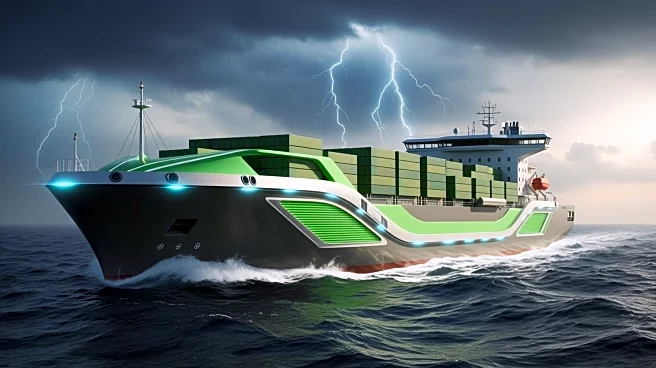What's Happening?
Recent analysis highlights the impact of geopolitical risks on global shipping decarbonization efforts. Utilizing sentiment analysis and the Geopolitical Risk Index, researchers have observed shifts in attitudes towards decarbonization within the shipping industry.
Before 2019, attitudes were gradually aligning with climate goals, but post-2019, geopolitical tensions have overshadowed environmental priorities. The Russia-Ukraine conflict in 2022 marked a significant decline in decarbonization attitudes, with subsequent events like the Nord Stream pipeline explosion exacerbating negative trends. The study reveals that geopolitical risks have led to a decrease in decarbonization attitudes, particularly in the Global North, where countries like the United States and Russia exhibit high levels of risk escalation.
Why It's Important?
The findings underscore the challenge of maintaining momentum in shipping decarbonization amid geopolitical crises. The decline in decarbonization attitudes could hinder progress towards international climate goals, affecting global efforts to reduce greenhouse gas emissions. Countries with higher geopolitical risks may deprioritize decarbonization, impacting international shipping policies and investments. This trend highlights the complex relationship between geopolitical stability and environmental commitments, with potential implications for global trade and climate policy. Stakeholders in the shipping industry, including policymakers and financial institutions, may need to navigate these challenges to sustain decarbonization efforts.
What's Next?
The study suggests that climate policies need continuous strengthening to counteract geopolitical risks. The International Maritime Organization's greenhouse gas emission reduction strategy and initiatives like the Poseidon Principles and Clyde Bank Declaration could play crucial roles in maintaining decarbonization momentum. However, heightened geopolitical risks may require adaptive strategies and increased international cooperation to mitigate their impact on shipping decarbonization. Countries in Southeast Asia, displaying more consistent decarbonization attitudes, may offer insights into effective policy responses amid geopolitical challenges.
Beyond the Headlines
The research highlights the ethical and strategic dimensions of decarbonization in the shipping sector. The Tragedy of the Commons is evident as countries with higher port throughput and carbon emissions are more susceptible to geopolitical risks, potentially wavering their decarbonization stance. This underscores the need for collaborative international efforts to address the shared environmental challenges posed by geopolitical instability.















